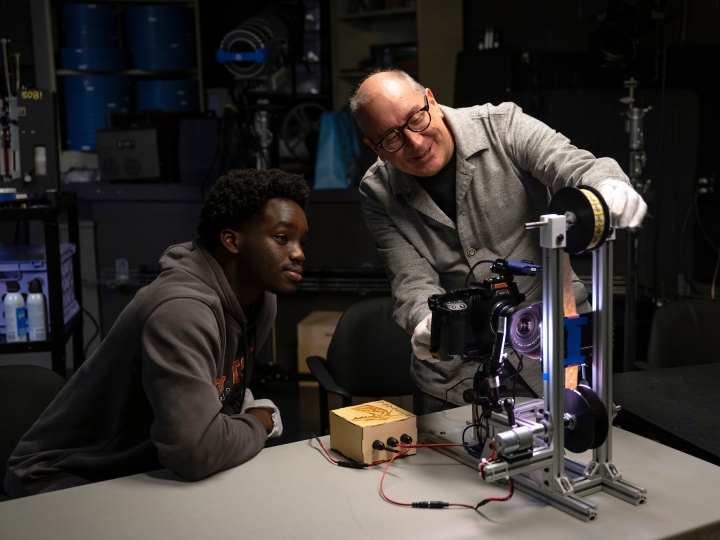Bucknell Faculty and Alumnus Will Study Bats and Disease in Uganda
February 3, 2017
Wildlife, and African fruit bats in particular, harbor some of the deadliest diseases to plague humanity in recent years. Ebola, Marburg and the SARS coronavirus have all emerged from contact between people and animals. And due to human activity — including encroachment into once pristine forests and the trafficking of bushmeat — spillovers of infectious diseases from wildlife to humans are on the rise.
To ward off the next deadly epidemic, it's vital for scientists to learn what conditions make a spillover from animals, including bats, more likely, according to Bucknell University Biology Professors DeeAnn Reeder and Ken Field. Thanks to a recent grant from the National Institutes of Health (NIH), Reeder and Field will embark on a two-year study of those conditions that will combine time-worn field biology methods with cutting-edge techniques for examining genetic data, and will begin with an expedition to collect samples in the East African nation of Uganda.
"Spillovers are a consequence of human contact with infectious bats, so we hope to identify when bats are likely to be more infectious," Field said. "This could be due to external factors, like season and food availability, or internal factors, like pregnancy or young bats that have not yet developed immunity to the viruses."
The study was enabled by a grant of more than $350,000 from the NIH's National Institute of Allergy and Infectious Diseases awarded to Reeder and Field in January. The timing of the award is significant, Reeder said, noting that the 2014 outbreak of Ebola in West Africa showed the world "that we really need to understand this system better."
"Like other wildlife species, bats can harbor deadly pathogens without being symptomatic," Reeder said. "Rather than simply cataloging the number and type of viruses that bats can carry, we are trying to understand how the health of these animals varies in their natural environment and how this is related to spillover of viruses to people."
The study will begin with an expedition to collect samples in Uganda. In collaboration with Bucknell alumnus Imran Ejotre M'16 (a Ugandan native who is now a doctoral student at Humboldt University in Berlin) and Uganda's Muni University, Reeder will collect bats from three sites in the country's northwestern district, commonly called the West Nile region.
The areas where the team will work are rural communities that have colonies of bats, which is particularly appropriate given the study's aim, noted Ejotre. "These are areas where we anticipate human-wildlife interactions to be taking place," he said.
Ejotre, who has collaborated with Reeder on research projects since 2010, highlighted the partnership with Muni University as an important feature of the study. "Dr. Reeder is passionate about Africa and building the capacity of African scientists," he said. "She believes that science in Africa can best be done by or in collaboration with African scientists."
Reeder has been working in the area for years, particularly in neighboring South Sudan, where in 2013 she discovered a rare species of bat, and in 2015 documented the first conclusive evidence of forest elephants in the area. Recent flare-ups in the ongoing South Sudanese civil war will prevent the team from travelling to South Sudan for this project, but they will be working with some of the same bat populations Reeder has previously studied, which inhabit forests along the border of the two nations. With this new initiative, Reeder hopes to bring Bucknell student researchers into the field with her.
"Doing the work in Uganda allows me to involve Bucknell students in a way that I wouldn't have been able to if we were working in South Sudan," she said.
Field will contribute his expertise as an immunologist who has worked extensively with bats — in particular those with white-nose disease, which has devastated North American bat colonies — as well as in dealing with the massive amounts of data generated by genetic analysis. The team will apply a variety of cutting-edge techniques to analyze the genetic material of the bats, both in the field and after the team returns to the United States.
"We're not just collecting samples to study gene expression," Reeder said. "This is a very comprehensive project about understanding the health of wild animals and how immunity varies, and further developing the tools that we need to understand animal health."
The researchers will use veterinary blood analyzers and other techniques to assess the health of the animals as they are captured. Upon returning to the United States, they will sequence the animals' genetic material using transcriptomics, a technique which provides a snapshot of every gene that is being expressed by a bat's DNA. The procedure provides a powerful window into the immune systems of bats who have contracted a disease. Last year, Field became the first Bucknell biology professor to publish a paper that utilized the technique.
The researchers hope the results of their study can be used to contain and prevent future outbreaks of diseases such as Ebola.
"DeeAnn works closely with international agencies, including colleagues in Africa who help to prevent and contain outbreaks," Field said. "Our results will help them focus on the methods of prevention that will be most effective. For example, if we determine that juvenile bats are more likely to shed infectious viruses, then that would indicate what time of year spillovers are more likely."

